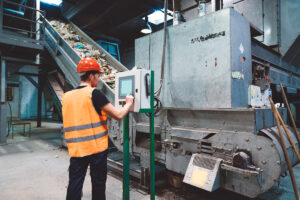If you’ve been following Extended Producer Responsibility (EPR) law implementation in Oregon, you might’ve heard the term “eco-modulation” bandied about quite a bit. If you haven’t been, it’s still an important term to know and we recommend getting up-to-speed on EPR laws ASAP. With Colorado, California, and Minnesota soon to follow, it’s essential to understand what ecomodulation means for producers who could benefit from these financial incentives.
Eco-Modulation Defined
At the most basic level, eco-modulation is a fancy term for incentivizing environmentally friendly practices and/or punishing environmentally damaging practices. Even simpler: financial rewards for positive actions and financial penalties for negative actions. Eco-modulation approaches differ between states, but they all share a few common pillars. One, a focus on incentivizing higher levels of PCR materials and encouraging sustainable packaging design. Two, emphasis on rewarding reuse and refill systems. Three, higher fines and fees for hard-torecycle materials and practices.
Eco-Modulation: Oregon
Oregon’s eco-modulation approach emphasizes gathering data – namely, life cycle assessments. The final program plan released December 6, 2024, details three different scenarios: Bonus A, B, and C. All are based on producer demonstration, through life cycle assessment, of >10% impact reduction to packaging materials.
Bonus A (simple disclosure): granted to producers who perform an LCA and disclosure on up to 10 SKUs. Bonus A is capped at $20,000 for each SKU evaluated.
Bonus B (substantial impact reduction): granted to producers who perform an LCA and disclosure on up to 10 SKUs AND demonstrate significant impact reduction to packaging based on LCA results. There are three impact reduction tiers – essentially, the higher impact reduction, the higher the bonus, with a cap amount of $50,000 for a SKU.
Bonus C (reuse/refill): As of May 16, 2025, OR is in the process of amending their plan to include a more detailed outline of Bonus C. Because of that, we don’t quite yet know what the final bonus will be. However, we do know that Bonus C will be centered on transitioning to reuse/refill programs.
Eco-Modulation: Colorado
Colorado’s plan refers to penalties as maluses – don’t let that confuse you! In CO, producers are rewarded with fee reductions for things like high recycling and refill rates, reductions in the amount of packaging materials used, innovative practices, high PCR material, and reuse/refill design and programs. Penalties (ok, Maluses…) increase dues for producers that use materials, practices, and/or designs that increase costs or disrupt the recycling, reusing, or composting of covered materials, as well as simply not using materials in the covered materials list.
Incentive and Malus rates are not yet finalized. We expect CO to publish them in October 2025.
Eco-Modulation: California and Minnesota
California and Minnesota are both on the path to EPR implementation over the next few years. California is currently amending their program, but we do know that eco-modulated (adjusted) fees will not be applied until two years after the approval of the plan. So, sit tight on that one. Similarly, the final Minnesota program plan has not yet been released but eco-modulated fees of some kind will be included in the plan. As with other eco-modulation approaches, producers will be incentivized to use materials and packaging designs that reduce environmental impacts, with a unique addition to also reduce human health impacts.



